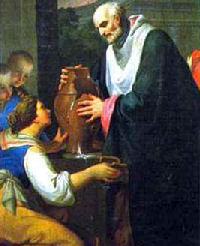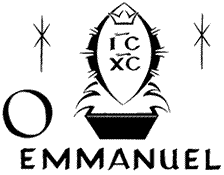
Daily Readings for:December 23, 2014
(Readings on USCCB website)
Collect: Grant, we pray, almighty God, that by the example of the Priest Saint John of Kanty we may advance in knowledge of holy things and by showing compassion to all, may gain forgiveness in your sight. Through our Lord Jesus Christ, your Son, who lives and reigns with you in the unity of the Holy Spirit, one God, for ever and ever.
RECIPES
o Pirohi
ACTIVITIES
o Advent and the Year of the Eucharist
o Advent Hymn: Veni, Veni, Emmanuel or O Come, O Come, Emmanuel
o Christmas Plays, Los Pastores and Las Posadas
o O Antiphons - December 17 - 24
PRAYERS
o Book of Blessings: Blessing Before and After Meals: Advent (2nd Plan)
o December Devotion: The Immaculate Conception
o Christmas Anticipation Prayer
o Book of Blessings: Blessing Before and After Meals: Advent (1st Plan)
· Advent: December 23rd
· Optional Memorial of St. John of Kanty, priest
Other Titles: John Cantius; John Kantius; John of Kanti; John of Kenti
Today the Church celebrates the optional memorial of St. John of Kanty, priest. Born in Kanty (Cracow, Poland), he taught at the university and became pastor of a parish. He was distinguished for his piety and love of neighbor.
We reach the culmination of the O Antiphons today. In previous antiphons our cry was directed to the Messiah as He manifested Himself to the Chosen People, to the Gentiles, and in nature; now He is addressed in person and asked to remain with us as Emmanuel.
Reading this final antiphon gives the feeling that a climax has indeed come. The very term Emmanuel, God with us, reveals the kindly, human heart of Jesus — He wants to be one of us, a Child of man, with all our human weakness and suffering; He wants to experience how hard it is to be man. He wants to remain with us to the end of time, He wants to dwell within us, He wants to make us share His nature.
St. John of Kanty John Cantius was born in the year 1397 in the Polish town of Kanty (whence his surname). He became a professor of theology, then parish priest; soon, however, he returned to the professor's chair at the University of Cracow. On foot he visited the holy places of Rome and Palestine. One day, after robbers had deprived him of all his effects, they asked him whether he had anything more. The saint said no, but hardly had they gone when he remembered having sewn some gold pieces inside his clothing; immediately he followed and overtook them. The robbers, astonished at the man's sense of truthfulness, refused to accept the money and returned to him the stolen luggage.
John Cantius was born in the year 1397 in the Polish town of Kanty (whence his surname). He became a professor of theology, then parish priest; soon, however, he returned to the professor's chair at the University of Cracow. On foot he visited the holy places of Rome and Palestine. One day, after robbers had deprived him of all his effects, they asked him whether he had anything more. The saint said no, but hardly had they gone when he remembered having sewn some gold pieces inside his clothing; immediately he followed and overtook them. The robbers, astonished at the man's sense of truthfulness, refused to accept the money and returned to him the stolen luggage.
To guard himself and his household from evil gossip he wrote upon the wall of his room (after the example of St. Augustine): Conturbare cave, non est placare suave, diffamare cave, nam revocare grave, i.e. "Guard against causing trouble and slandering others, for it is difficult to right the evil done." His love of neighbor was most edifying. Often he gave away his own clothing and shoes; then, not to appear barefoot, he lowered his cassock so as to have it drag along the ground. Sensing that his death was near at hand, he distributed whatever he still had to the poor and died peacefully in the Lord at an advanced age. He is honored as one of the principal patrons of Poland.
Patron: Lithuania, Poland.
Symbols: Dressed in a professor's gown with his arm around the shoulder of a young student whose gaze he directs towards heaven; giving his garments to the poor.
Things to Do:
- Since this day falls so close to Christmas, it would be a good time to perform acts of charity for the poor who will be suffering and alone during this holiday season. Contact your local council or St. Vincent de Paul organization in your parish to find out what families are needy. Make a food and gift basket to present to this family.
- Another good work would be taking the family to visit a nursing home. This time of year is quite depressing for those who do not have family.
- Take some time to learn a little about Poland and its history and heritage.
- Serve some Polish food, like pierogies and kielbasa (Polish sausage). You can try to make these from scratch, or find them ready-made in your grocery store.
- Recite the Vespers hymn to St. John Kanty, O Glory of the Polish Race.
![]()
 7th O Antiphon:
7th O Antiphon:
O Emmanuel, God with us, our King and law-giver,
The awaited of the peoples,
And their Savior,
COME
To save us,
O Lord our God.
![]() Today is Day Eight of the Christmas Novena.
Today is Day Eight of the Christmas Novena.